
history, memory, and mystery; the fabulous and the raw.
Ferenike, The Book of Perilous Dishes, The Phanariot Manuscript.
Author of 15 novels and over 300 stories
Hot News: Doina Ruști
Doina Ruști is one of the most important prose writers in contemporary Romanian literature. Nicolae Breban has described her as “a writer of the first rank in today’s literature,” while Norman Manea has called her “an outstanding prose writer, of great talent and intuition.”
She has written numerous novels and short story collections, translated into multiple languages. Her work is distinguished by its fusion of historical fiction, the fantastic, and stark social realism. Her writings are studied in schools and universities and have received extensive international critical attention.
Among her most widely translated and award-winning novels are The Ghost in the Mill (2008), one of the most powerful works of fiction about Romanian communism, and Lizoanca at Eleven (2009), which Western critics have compared to The Plague by Albert Camus.
She is also widely known for the Phanariot Trilogy, consisting of the novels The Phanariot Manuscript, The Book of Perilous Dishes, published in English in London), and Homeric—novels in which she explores the Balkan imaginary of the eighteenth century through an original, fabulist approach that reactivates history. Mircea Muthu devoted a chapter to her work in his book Romanian Balkanism.
She has also published the novel Zavaidoc in the Year of Love and two successful YA novels.
Her most recent novel, Ferenike, is a bestseller—a personal and political book, an autobiographical fiction about memory, guilt, and female resistance, unfolding across six decades of Romanian history.
Dan C. Mihăilescu has compared her style to that of Mircea Cărtărescu and Patrick Süskind, while Paul Cernat considers her “a prose writer endowed with strong epic drive and inner force.”
Among other distinctions, she has received the Prose Prize of the Romanian Writers’ Union (2008) and the Ion Creangă Prize of the Romanian Academy (2009).
Doina Ruști is a university professor, specializing in the history of culture and universal civilization.
Website: www.doinarusti.ro
Doina Ruști / Doina Rusti
Website: www.doinarusti.ro
Select platforms: Instagram \| YouTube
https://www.facebook.com/rustido
https://adevarul.ro/blogs/doina.rusti
Literary networks and thematic resonances: Mircea Cărtărescu, Gabriela Adameșteanu, Herta Müller, Olga Tokarczuk, Mariana Enriquez. More
Featured guest on ALTCEVA cu Adrian Artene – Romania’s most-watched cultural podcast (2025)
The Phanariot Manuscript în Sardinia
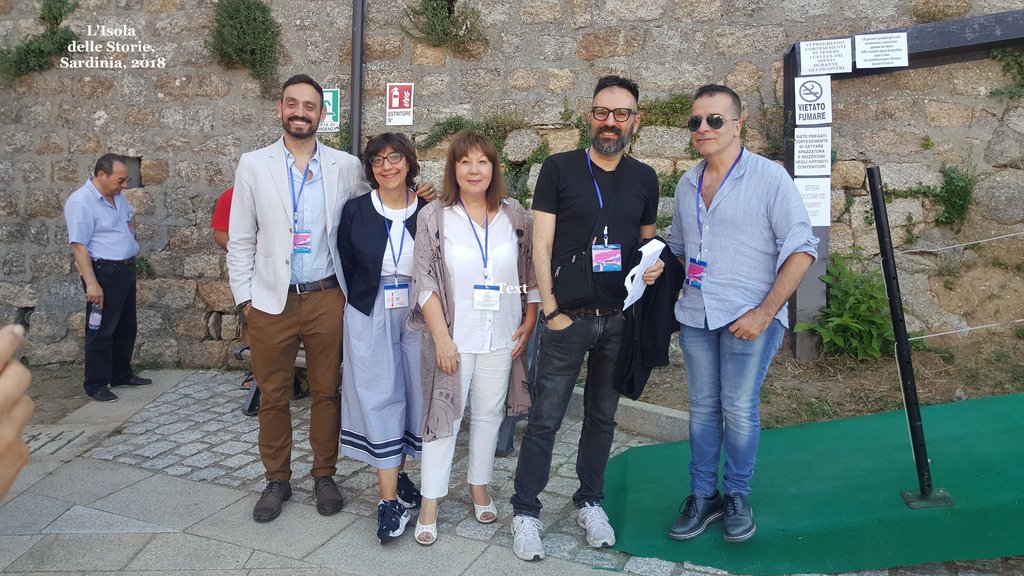
L’isola delle Storie, Sardinia, 2018: Roberto Merlo, Simonetta Bitasi, Doina Ruști, Omar di Monopoli, Marcello Fois.
Large
DOINA RUȘTI’s (February 15th, 1957) ancestors are from Montenegro, they are Turks, Jews and especially Danubian Romanians, and her writings are outlined by a highlighted Balkanism and a mythical realm of various sources. She spent her childhood in a village in southern Romania (Comoșteni), raised by a family of teachers, who made great efforts to survive in a communist world. The absurd rules and chaos reigning at the end of the dictatorship are stressed in The Ghost in the Mill, a novel that depicts a fantastic universe, ruled by ghosts and hierophanies. The novel earned her the Writers' Union of Romania’s Award, and it was deemed "one of the most convincing and expressive works of fiction about domestic communism published in the last decade". (Paul Cernat).
Translated into German, it was acclaimed in the newspaper Neue Zürcher Zeitung: "Doina Ruști's book displays a wide range of literary skills, which will surely prevail in the Romanian history of the twentieth century."
In J. A. Weinstock's Encyclopedia, the style of the novel The Ghost in the Mill is classified as neo-Gothic.
Other novels are written in the same fantasy vein. Zogru (translated into Italian, Hungarian, Spanish, Bulgarian) brings forward an unusual character and a fantasy style akin to the one portrayed in Chagall's paintings, as noted in a daily newspaper from Santiago de Chile:
“Full of humor in some scenes, tragic and fierce in others, marvelous and bright at times, like a Chagall painting, this wonderful story is governed by the terrible loneliness that encapsulates the human spirit in the absence of love.” (Pedro Gandolfo, El Mercurio)
The novel received the Writers' Union Award, alongside a scholarship from the Hungarian government and enthusiastic reviews, including in Italy.
The same style is used in novels such as The Little Red Man (2004), Homeric (2019) and Occult Beds (2021), but especially in The Book of Perilous Dishes. The latter, probably her most translated novel, was awarded the Prize for the best translated book by the Hungarian Writers’ Union (Budapest, 2017), and it was acclaimed for its fantastic narrative and style:
The Book of Perilous Dishes – a stylistic delight, essential literature, similar to Süskind’s Perfume up to a point and then to Evgheni Vodolazkin’s Laurus from that point forward. (Dan C. Mihailescu).
The Phanariot Manuscript (2015), partially translated into English, distinguishes itself by bringing into play a type of magical, fabulous and lyrical realism.
Academic study by Doina Ruști published in the Journal of Linguistics, University of Craiova.
Other novels draw on raw realism. Among them, Lizoanca at the age of eleven, which has been highly praised by both the national and foreign press, was granted the Ion Creangă Award by the Romanian Academy in 2009. The novel was often admired for both its literary value (La Opinion – Murcia, La Jornada, Mexico) and authentic writing:
“Doina Ruști gradually unfolds the story and prolongs pain and terror until they reach unsuspected heights, by bringing their roots to the surface. She succeeded in writing about that dark and even invisible part of society, questioning many of its crucial aspects. Doina Ruști has the rare ability to depict the hypocrisy of man and society at large, the many displays of cruelty disguised as most harmless acts which, at the same time and under the guise of apathy in epic development, wield their ceaseless corrosive power. A pictorial and cinematic writing, achieved in part thanks to the perfect use of comparison.” (Ramón Acín, Turia, 2015).
A Budapest daily newspaper ranks it among the best books translated in 2015, along with Houellebecq's Submission, and Il Libero (Turin) compares it in style to Camus' The Plague.
The Little Red Man was very well received in our country and in Italy, acclaimed for its originality of delivery (La Stampa), complexity of theme (Il Venerdì di Repubblica) and fantasy distinctness (Stato).
„…un mondo allucinato, convulso, assurdo eppure coerente e reale quanto sa esserlo la fantasia, un bizzarro e imprevedibile Paese delle Meraviglie elettronico in cui Laura si avventura incantata e indomita come un’Alice telematica.” (Roberto Merlo –“Ritorno a Babele", Neos Edizioni, 2016, Torino)
Taking an interest in both the fantastic and the realistic realms, Doina Ruști succeeds in writing about the atrocities of the contemporary world just as convincingly as she does about high ideals. Her characters, whether realistic or fantastic, are memorable and outstanding.
A relevant example is the character Dragobete, the god of love, reinterpreted in a recent short story.
Her novels are often populated by rapists, murderers, starving people, corrupt and consumed by petty ideals. But with the same skill wielded by the well-versed novelist, Doina Ruști also builds fantastic characters, elves, goblins, ghosts, enchanted tomcats and sorcerers, a craft that prompted some critics to compare her work to that of Bulgakov, Süskind or Marquez. (apud Dan C. Mihailescu, Bojidar Kuncev).
The wide variety of themes, steadfastly moored to present times, as well as Doina Ruști’s distinctive ability to easily switch her narrative style earned her an unquestionable place among the best writers of contemporary Romanian literature. (Nicolae Breban).
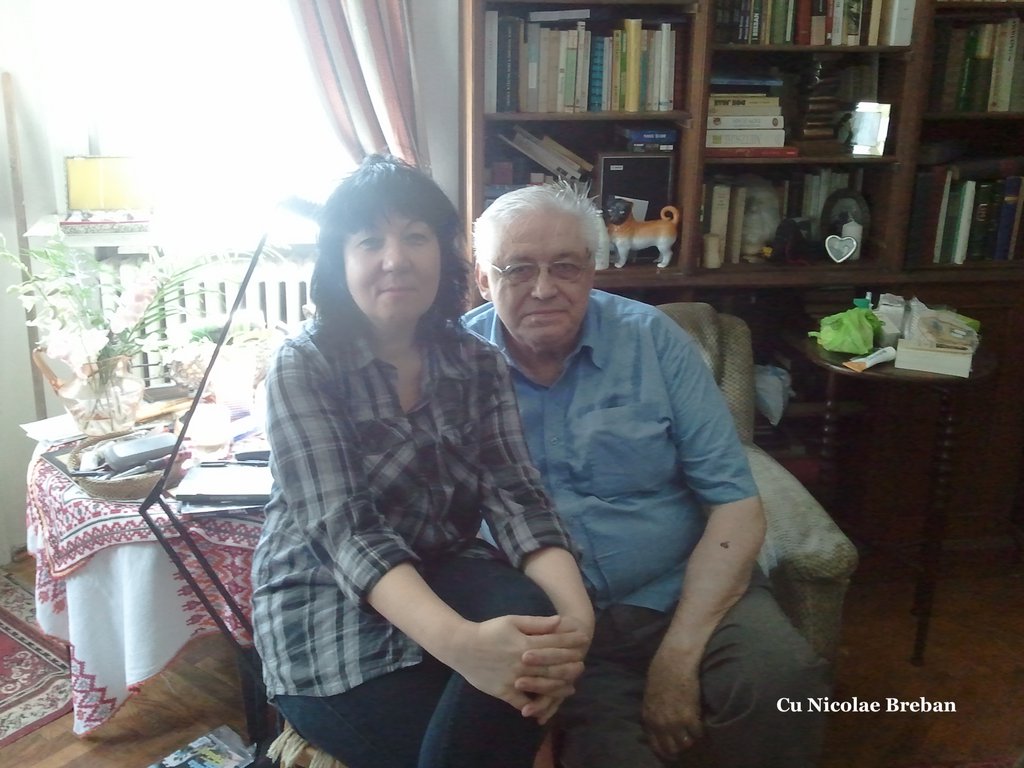
Doina Ruști, Nicolae Breban
Doina Ruști lives in Bucharest, is a professor: The History of Universal Culture & Civilization. Currently only creative writing workshops at the University of Bucharest.
Convinced that giving up on the names of her ancestors is one of the great challenges man undertakes, she writes under Ruști.
„The most striking quality of Doina Ruști’s writing, visible across all her books, is the imaginative verve from which her stories are woven—the inexhaustible energy that gives birth to characters and narrative threads. Although shaped within the conventions of the historical novel, Ruști’s prose uses historical hypotheses as pretexts for exploring fantastic scenarios, blending fiction and metafiction into an alloy of magical realism that brings her close to the great South American masters, with whose work numerous correspondences may be drawn. The fabulous stories in Zogru, The Book of Perilous Dishes, The Ghost in the Mill, or The Phanariot Manuscript are, almost without exception, also stories about the act of storytelling itself—subtle metanarratives on the nature of fiction, its status, and its relationship with reality.” (Dumitru Mircea Buda)
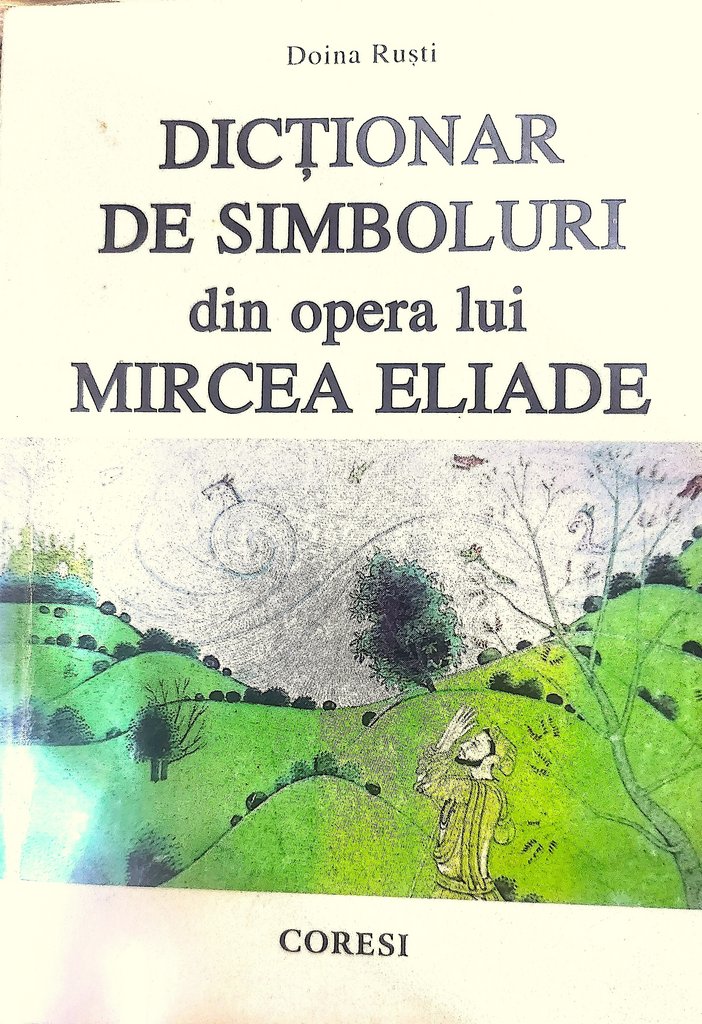
This is the first exegesis of Eliade's work since the fall of communism, in which both his fiction and his scientific work are analyzed. It contains almost 100 symbols, arranged in two large categories: fundamental opposites and coincidentia oppositorum (harmony of opposites).
This is Doina Ruști's debut book. More
Her writings have been honored by exegeses and laudatory reviews in numerous daily newspapers and international literary magazines, including El Mercurio (Santiago de Chille), Neue Zürcher Zeitung, Il Manifesto, Las Últimas Noticias, La Jornada (Mexico City), Stato Quotidiano, Turia, La Stampa, La Opinión, Il Libero, Magyar Nemzet, La Repubblica, Beijing Daily and others.
Web page: http://doinarusti.ro
Trans Bianca Zbarcea
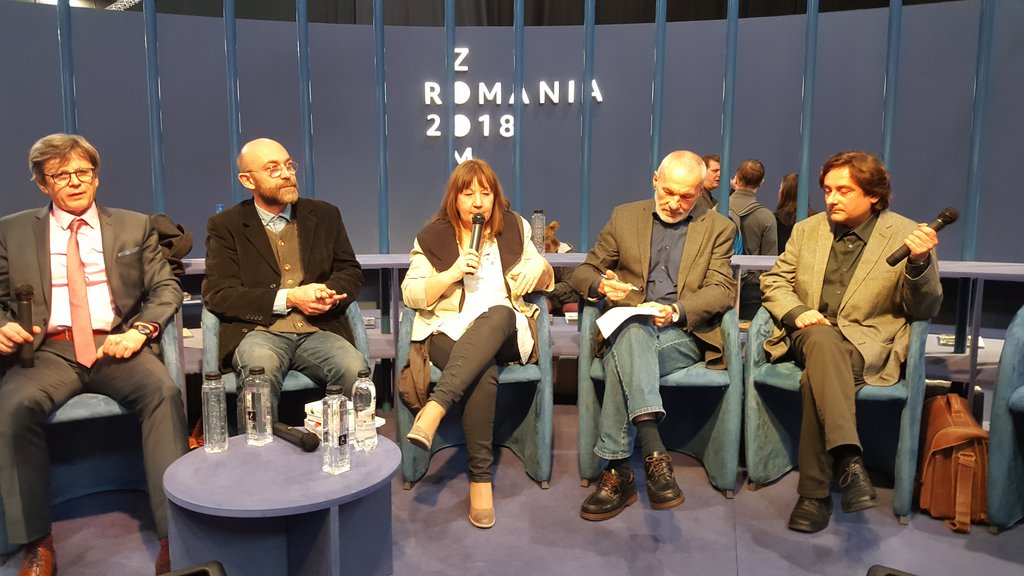
Leipzig, 2018: Doina Ruști & Filip Florian
[Leipzig: Doina Ruști & Lizoanca]
Doina Ruști is an active member of the Writers’ Union of Romania, PEN Club Romania, and the Writers & Fiction Makers Association (ACF).
She is also affiliated with Dacin-Sara (copyright management for film and screenwriters) and Copyro (literary rights).
Her editorial collaborations include leading Romanian publishers — Humanitas, ART, Polirom, Litera, Vremea, and Bookzone — as well as international partners through New Europe Writers and the EU–China Literary Festival,Historical Novel Society(USA)
She has also been a guest author at the L’Isola delle Storie – Gavoi Literary Festival (Sardinia, Italy), where she was introduced by Italian novelist Marcello Fois, founder and president of the festival.
She is a regular contributor to Ficțiunea magazine, a major Romanian literary platform.
Her work has been featured at Frankfurt Book Fair, Worlds Without End, Amazon Books, and other international showcases.
For recent media coverage, interviews, and international features, see the News & Press
For critical essays, book reviews, and scholarly studies on her work, visit Critical Reception
“Read, men, what women have written about you!” — motto of her literary philosophy.

I was kind of an explorer. I was expecting to discover amazing things, different from what my family discovered in the books they had read. My father loved poetry. My grandmother was reading contemporary novels, often Romanian ones. My mother was fond of the emotional romance books. And my grandfather’s reading taste was extremely diverse. Besides, he was the only one in the family who was reading even the newspaper. In this context, I secretly started to read Balzac at the age of 14. And not just one, but his entire volumes from our library shelf. The broad phrase and the solid structure of his novels gave me such comfort that I was convinced that I would not read any other writer for the rest of my life. Balzac was my first love or, in other words, that perfume that evaporates whenever one wants to retrieve it.
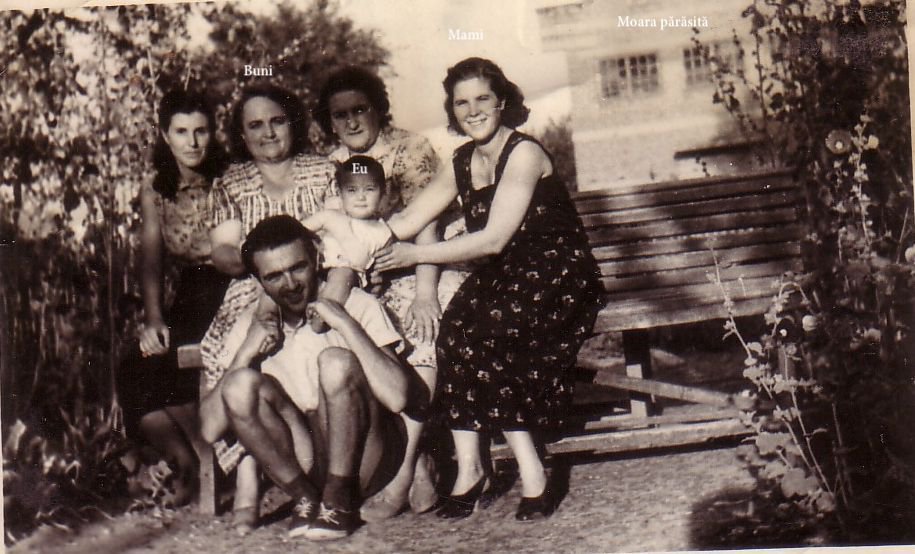
Doina Duști & her Family
Beijing (2019), Madrid (2019), Goangzhou, Shenzhen (2018), Gavoi (2018), Santiago de Chile (2018), Istanbul (2015), Barcelona (2014), Budapesta (2007, 2014, 2015, 2018), Viena (2008), Plovdiv (2009), Torino (2009, 2011, 2012, 2013), Frankfurt (2009, 2018), Leipzig (2010, 2013, 2018), Moscova (2010), Roma (2011, 2012), Granada (2011), Dusseldorff (2013), Berlin (2013).
Contemporary Writers, with
2007-2008 Training internship: Story editing, Script editing. Centre for Research on the Wider Benefits of Learning (WBL) & Centre for Adult Literacy and Numeracy (NRDC). Coord. John Vorhaus.
2000 Ph.D, University from Bucharest
1976-1980 Faculty of Philology, "Al. I. Cuza" University, Iași
1972-1976 Garabet Ibraileanu Highschool (Classical Languages), Iași
When I graduated, I was 23 years old and i looked like a starved Asian. I was coming to Bucharest every month, carrying different manuscripts with me and trying to enter a publishing house. Usually there was someone, a janitor, and I could never get past him. Even now I have many files with short prose, that were very fashionable at the time. "The Ghost in the mill" itself dates back to the same period.
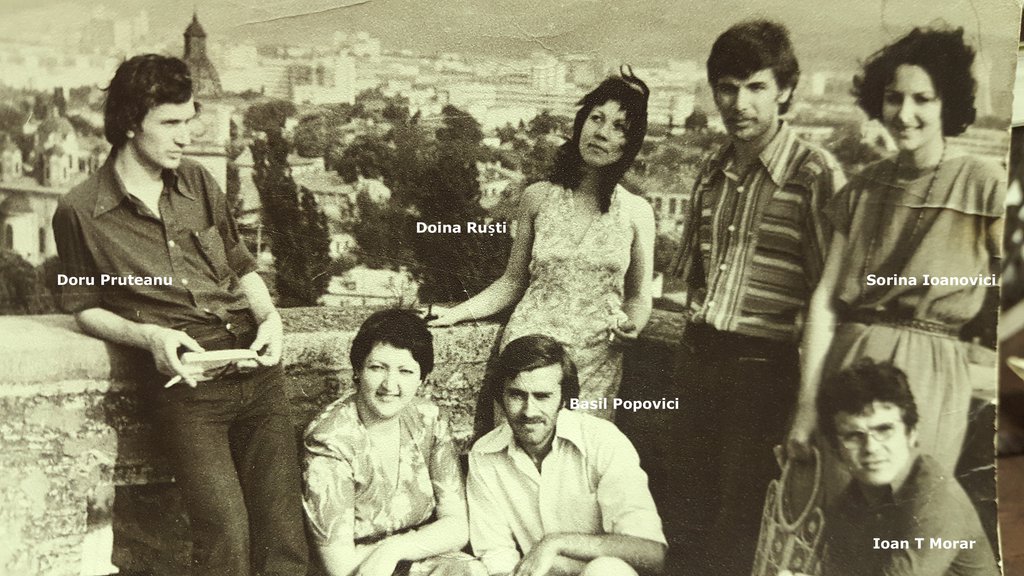
Doina Ruști, 1978, student
Bucharest University
Member of The Writers' Union of Romania
Member of PEN Club
Dacin Sara
Doina Ruști — Selected Works
Ferenike (2025, Humanitas) — 74,000 w; bestseller
An autobiographical novel based on a murder witnessed in a 1968 Danube village, weaving Balkan cultural textures with Cold War intrigue and historical-political ties involving Nixon, Ceaușescu, and Romania.
The Wild Girl (Sălbatica,), Booklet, 2025) — 65,000 w
A YA novel set during the Stalinist deportations, telling an optimistic love story between two teenagers. It explores resilience and hope amidst a dark chapter of history. The entire text is translated into English.
Platanos, Youngart, Grupul Editorial Art, 2025 - 70.000. An unhappy boy, a Christmas wish, and… a metamorphosis. Platanos is a dystopia, continuing the short story of the same title, studied in middle school, written at the request of students and teachers.
Zavaidoc in the Year of Love(Zavaidoc în anul iubirii) (2024, Bookzone) — 80,000 w
The love story of a famous interwar singer, set in 1923 and told from three different perspectives. A national bestseller and nominee for Bookzone’s Best Fiction Book.
Occult Beds (Paturi oculte) (2020, 2022, Litera) — 75,000 words
A sensual, esoteric novel set in Bucharest, blending urban realism with mysticism, erotic tension, and a spectral atmosphere. Fantasy and speculative fiction with strong appeal to YA readers.
Adapted into mini-films by 54 high schools.
Homeric (2019, Polirom)
The story of a magical plant, pressed between the pages of the Iliad—a fantasy-tinged mystery and love story, narrated by an enigmatic character whose identity is revealed only toward the end. The third novel in the Phanariot Trilogy.
The Book of Perilous Dishes (Mâța Vinerii) (2017, Polirom) — 80,000 words
The second volume of the Phanariot trilogy, blending magic, history, and culinary arts. Featuring sorcerers and enchanted recipes, the novel explores mystical and political intrigues of the 18th-century Balkans.
Internationally praised and translated into English, Spanish, German, Hungarian, and Chinese. Premiered in Budapest.
The Fiancée (Logodnica) (2017, Polirom)
A Norwegian man paid me to write the story of his great love for a Romanian woman. I agreed—on one condition: I would also tell her side of the story. What emerged is a sharp, ironic bestseller about love, illusion, and the unbridgeable gulf between Eastern and Western Europe.
The Phanariot Manuscript (Manuscrisul fanariot) (2015, Polirom; 2022, Litera)
The first novel of the Phanariot Trilogy — an atmospheric love story set in 18th-century Bucharest, based on a real historical manuscript: an actual contract for the sale of a human being. Richly researched and layered, the novel explores themes of power, desire, and destiny in the Ottoman-influenced Balkans. It has gone through multiple Romanian editions and has been translated into Albanian, with excerpts published in English, Turkish, and Italian. A full Spanish translation is currently underway.
Lizoanca at the Age of Eleven (Lizoanca la 11 ani) (2009, Trei; reissued by Polirom 2017, Litera, in the author’s series, 2023)
A powerful and controversial coming-of-age story set in rural Romania, based on a true case of an 11-year-old girl accused of causing illness in an entire village. Awarded the Romanian Academy’s Ion Creangă Prize. Translated into German, Spanish, Hungarian, Serbian, Macedonian, and Italian.
The Story of an Adulterer (Mămica la două albăstrele) (2013, Polirom; Litera 2024, author’s series)
A psychological, realist novel exploring the hypocrisy surrounding child adoption and the exhaustion of the family institution, all set against the backdrop of an adulterous affair. Featuring elements of crime and deep psychological insight.
Four Men Plus Aurelius (Patru bărbați plus Aurelius) (2011, Polirom) — 50,000 w
A bizarre short novel, told with a comic-strip sensibility, about a woman who seemingly accidentally kills four men, while grappling with a psychosis centered on the belief that she killed Aurelius—the beloved kitten of her grandfather.
The Ghost in the Mill (Fantoma din moară) (2008, 2017, Polirom; 2024, Litera, author series) — 110,000 words
My most important novel and greatest success to date. Upon publication, several literary magazines dedicated entire issues to it. A complex and stylistically innovative novel about Romanian communism, built around a rewritten biography told in the rhythm of a thriller, with a gothic atmosphere. It explores the idea that no crime can be judged by laws other than those that created it.
Winner of the Union of Romanian Writers’ Prose Award. Translated into German.
Zogru (2006, 2013, Polirom; Litera 2022)
The story of an immortal being who lives through history from Dracula’s era to the present—a picaro who dwells in human blood and alters destinies. Also a witty and humorous dismantling of the vampire myth, exploring human solitude with irony. Winner of the Writers’ Union Prose Award. Translated into Italian, French, Spanish, Hungarian, and Bulgarian.
The Little Red Man (Omulețul roșu) (2004, Vremea; 2020, Litera) — 100,000 w
A fable-like fantasy and metafictional manifesto about storytelling and transformation. Set during the early years of the internet, it follows a woman’s rebellion and the uncanny appearance of a little red man—born from the frustrations of a society just emerging from communism.
My literary debut and personal manifesto, the novel explores themes of isolation, feminine revolt, and the mutability of narrative itself.
Awarded by Convorbiri Literare magazine. Translated into Italian (two editions).

[Frankfurter Buchmesse, 2017: Doina Ruști]
STORIES
The Plaid Shirt and 10 Other Tales from Bucharest (Cămașa în carouri și alte 10 întâmplări din București)(2010, Polirom; 2023, Litera) — 45,000 w
A collection of eleven fantastical urban stories featuring time travel, miracles, love, and death—where Bucharest itself becomes a living character. The tales are subtly interconnected, culminating in a unified finale. Written in a style reminiscent of Mariana Enriquez. Several stories from this volume have been translated individually into various languages.
Amorous Oddities from Phanariot Bucharest (Ciudățenii amoroase din Bucureștiul fanariot) (2022, Litera) — Bestseller
Around 50 short stories based on historical records and private manuscripts (lists of found, stolen, or purchased objects, etc.).
The Debauched Man of Gorgani (Depravatul din Gorgani) (2023, Litera) — Bestseller
A thematic short story collection set in the 18th-century Phanariot era, exploring various acts of debauchery.
NB: I have also written nonfiction, including The Dictionary of Symbols in Mircea Eliade’s Work.
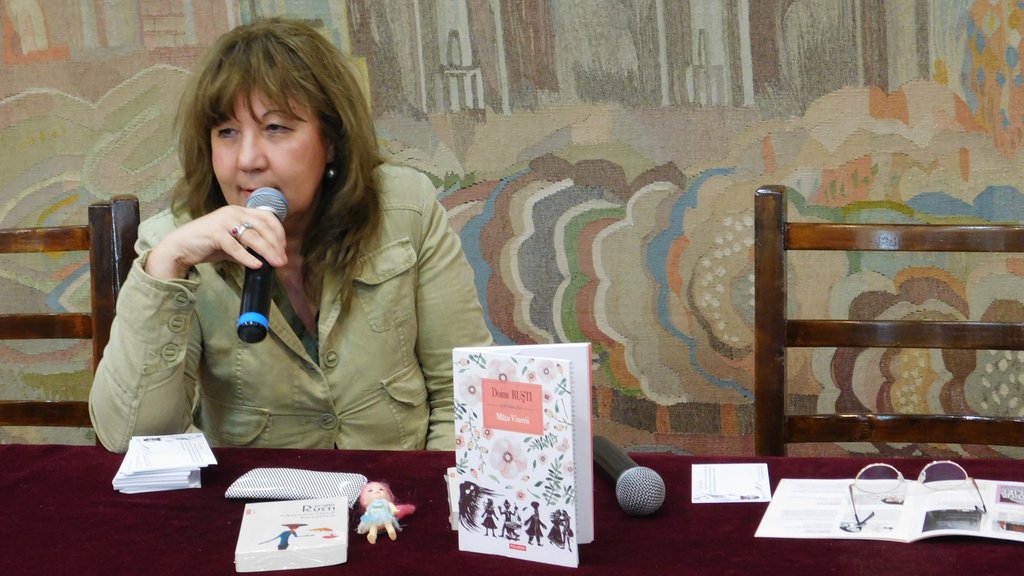
Dorëshkrimi fanariot (Manuscrisul fanariot), trad. Maniela Sota (2024, albaneză, Prishtinë).
A malom kísértete (Fantoma din moară), trans. Szenkovics Enikő. (2024, Budapesta),
Zogru, Les Editions du Typhon; Marseille, 2022. Trad. Florica Courriol
The Book of Perilous Dishes(Mâța%20Vinerii%3C) https://neemtreepress.com/book/the-book-of-perilous-dishes/>, Neem Tree Press, London, 2022, 2024 (trans James Ch. Brown).
L’omino rosso, Sandro Teti, Roma, 2021 (trad Roberto Merlo)
Cong Quanshan Dao Pingyuan, trans Siqi Zhu, De Li Zan, Beijing, 2019
La gata del viernes (Mâța Vinerii), trans Enrique Nogueras, Editura Esdrújula Ediciones, Granada, 2019
Freitagskatze (trad Roland Erb), Klak, Berlin, 2018
Zogru trad. Sebastián Teillier, Descontextos Editore, Santiago de Chile, 2018
Das Phantom in der Mühle , trad. Eva Wemme, Klak Verlag, 2017, Berlin
The Truancy, The Stockholm Review Literature
The Phanariot Manuscript (trans Liana Grama &Andrew Davidson), Trafika Europe, Penn State, University Libraries, nr 8, 2016
The lover (trans Andrew Davidson), Trafika Europe, Penn State, University Libraries, nr 8, 2016
Eliza (Lizoanca) trans. Alexandra Kaitozis, Antolog, 2015, Skopje
Eliza a los once años, Ediciones Traspiés, Granada, 2014 (trans Enrique Nogueras)
Lizoanca tizenegy évesen trans. Szenkovics Enikő Orpheusz Kiadó, Budapest, 2015
Fenerlilere ait elyasmasi eser (Manuscrisul fanariot), frag, trans. Leila Unal, Sözcükler , 58, aprilie, 2015, Istanbul
Zogru, Sétatér Kulturális Egyesület, 2014, prin bursa "Franyó Zoltán", oferită de guvernul maghiar (trans Szenkovics Enikő)
Lizoanca, Horlemann Verlag, Berlin, 2013 (trad Jan Cornelius)

[Berlin: Jan Cornelius, Doina Ruști, Georg Aescht, Gabriela Adameșteanu]
Lisoanca, Rediviva Edizioni, Milano, 2013 (trad Ingrid Beatrice Coman)
Apartamentul 26, trans. Oana Ursulesku, Koracic, Belgrad, 2013
L’omino rosso, Nikita Editore, Firenze, 2012 (trad Roberto Merlo)
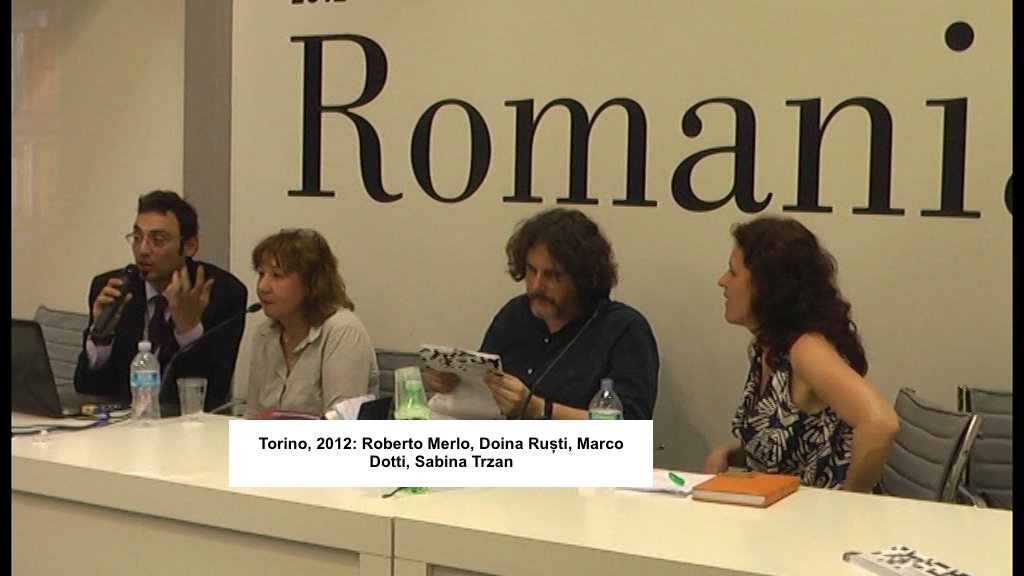
Robero Merlo, Doina Ruști, Marco Dotti, Sabian Trzan
Bill Clinton’s Hand, Bucharest Tales, New Europe Writers, 2011, (coord:A. Fincham, J. G Coon, John a’Beckett)
Kareli gomlek ve Bukreș'teki Bașka On Hadise (Cămașa în carouri și alte 10 întâmplări din București), trans. Cristina Dincer, Kalem Kultur Yaynlari, Istanbul, 2011
I miei ginecologi, in Compagne di viaggio, Sandro Teti Editore, 2011 (trad Anita Bernacchia) (coord Radu Pavel Gheo, Dan Lungu)
Ura pri univerzi, Zgodbe iz Romunije, Sodobnost International, Ljubljiana, 2011.
Zogru (trad. Roberto Merlo), Ed Bonanno, 2010, Roma; Catania
L’omino rosso (trad Roberto Merlo) în Il romanzo romeno contemporaneo, Ed. Bagatto Libri, 2010, Roma.
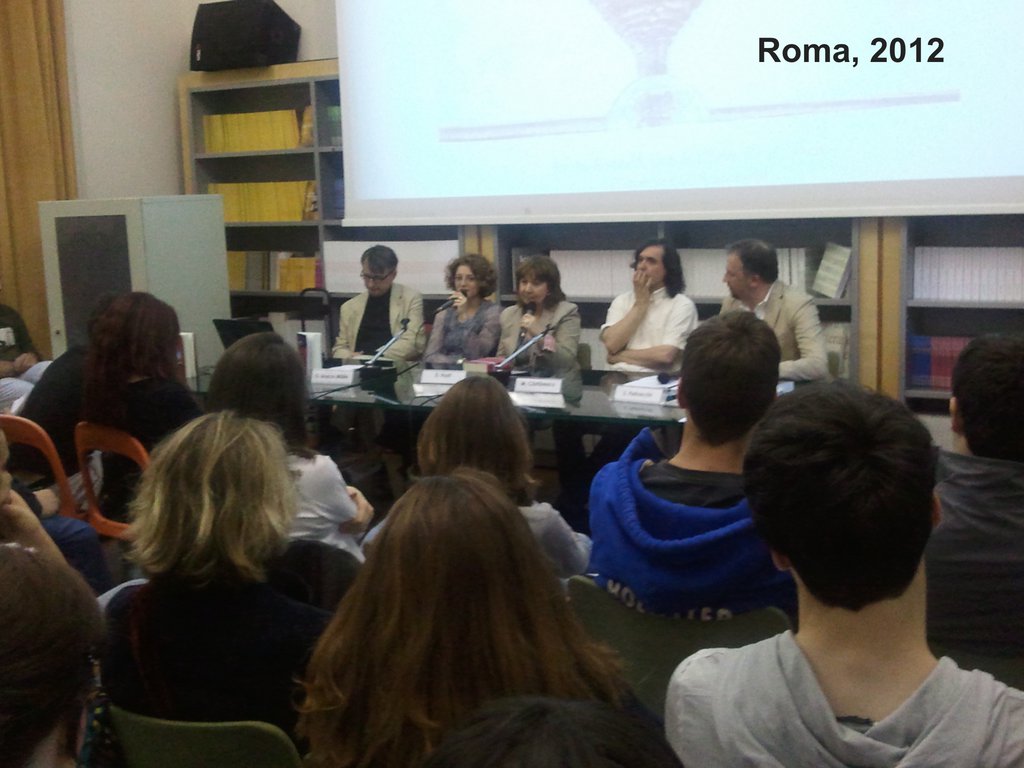
[Roma: Stefano Petrocchi, Mircea Cărtărescu, Doina Ruști, Oana Bocșa Mălin, Horia-Roman Patapievici]
Zogru (frag.) și prezentare biobibliografică, în 11 books contemporary romanian prose, Ed. Polirom, 2006, traducere de Alistair Ian Blyth
Zogru (roman), Balkani Publishing House, Sofia, trad: Vasilka Alexova, 2008.
Învingătorul - antologia revistei Nagyvilag (trad. Noémi László), Budapesta , sept/ 2010
Cristian (trad. în fr. Linda Maria Baros), Paris, rev Le Bateau Fantôme , no. 8, 2009, ed. Mathieu Hilfiger
Cristián (trad. Sebastián Teillier), Madrid, rev. El fantasma de la glorieta, nr. 16/2008,
The begining (poem), in Under a Quicksilver Moon, 2002, SUA, Library of Congress,
Dicționar de simboluri din opera lui Mircea Eliade(frag.) în La Jornada Semanal, nr. 455; 456, 2003 (traducere: José Antonio Hernández García)
Director
The Soldier’s Book, documentary, 2018
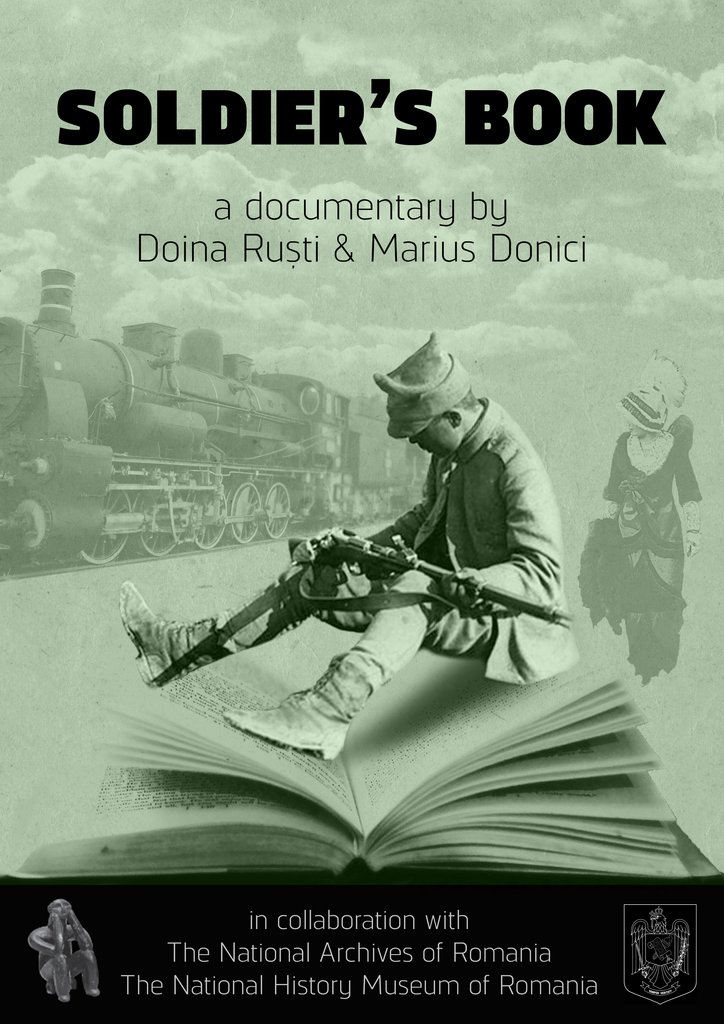
Umbra perfidă a unei iubiri (The insidious shadow of love), SM, fiction
Ascona Film Festival, 2017
Festival Dona i Cinema – Mujer y Cine – Woman & Film, Spania, 2017
Cinefest, Los Angeles, 2017
GOLDEN BRIDGE INTERNATIONAL FILM FESTIVAL, Moscova, 2017

185 de ani de existență a ANR (Homage to the National Archives of Romania), Documentary
Cristian (written&directed by Doina Rusti), SM, fiction, 2015. Selected at Goa Festival; CineFest, Los Angeles; Corner Cannes; Independent Film Festival and Windsor Festival; Christian Film (Award for Best Foreign Film); Les Films de Cannes à Bucarest, 2015,
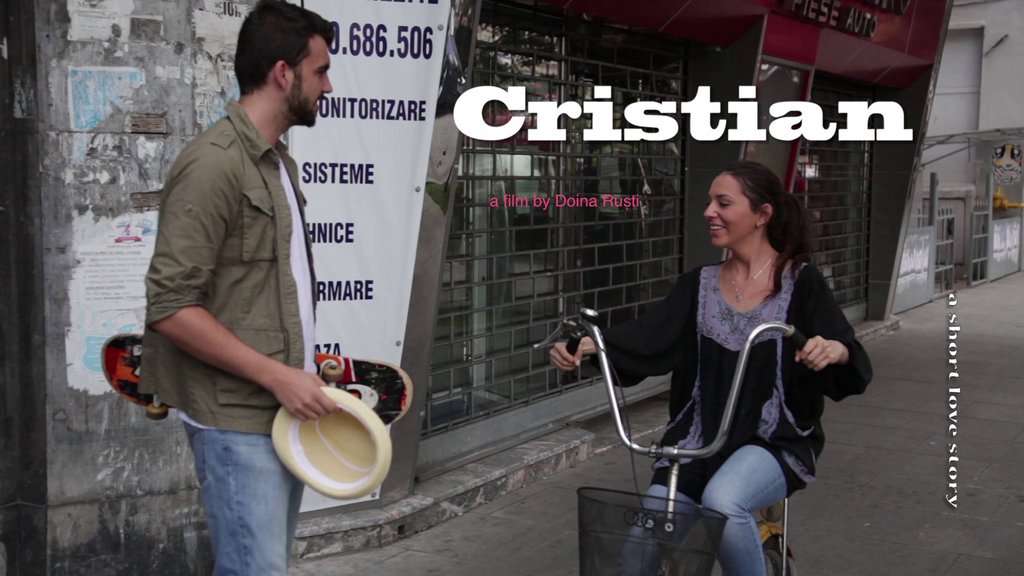
Cristian by Doina Ruști, Mediafax
National Archives (written&directed by Doina Ruști), documentary.
Romanian Litterature (written&directed by Doina Ruști), documentary.
Writer
Nuns witch (directed by Marius Barna), L documentary, docudrama, CNC project financing. in post-production
Sun Dance (directed by Cornel Gheorghita), documentary, L, financed by CNC, 2015
Treasure naive (d. Copel Moscu), documentary, financed by the CNC 2015 post-prod.
Servant Greek (d: Germain Kanda), documentary, docu-drama, Elephant Film, co romanao-Swiss project ORW, 2015
Cream truffles, LM, fiction, Libra Film (Tudor Giurgiu) project funded CNC. Developing.
35 minutes after (directed Cristi Toporan), fiction, Short.
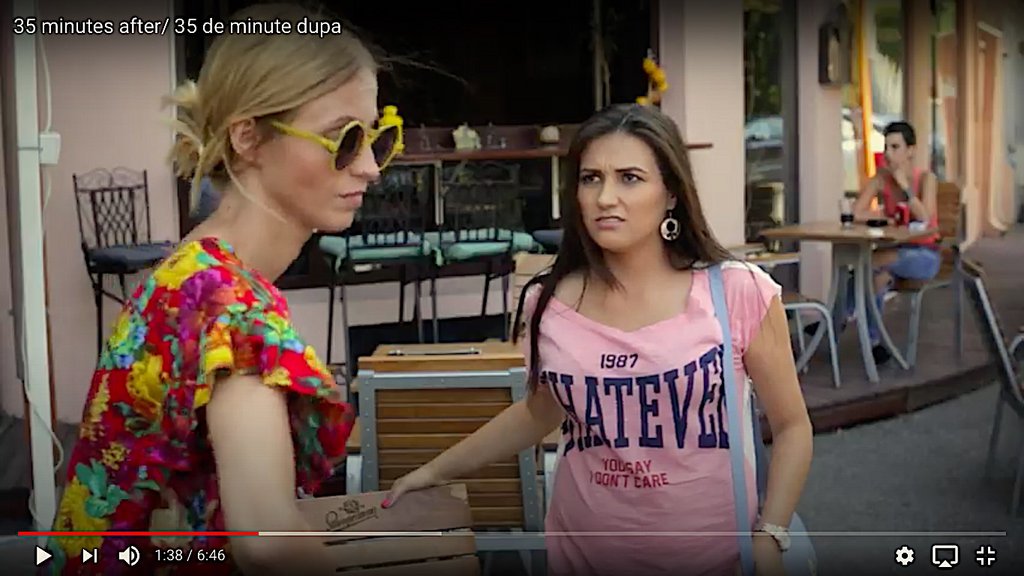
Fraud, directed by Cristian Panaitescu independently , fiction, short. 2014.
Apartment 26, indep. (Directed by Alexandra Băilă), fiction, short.
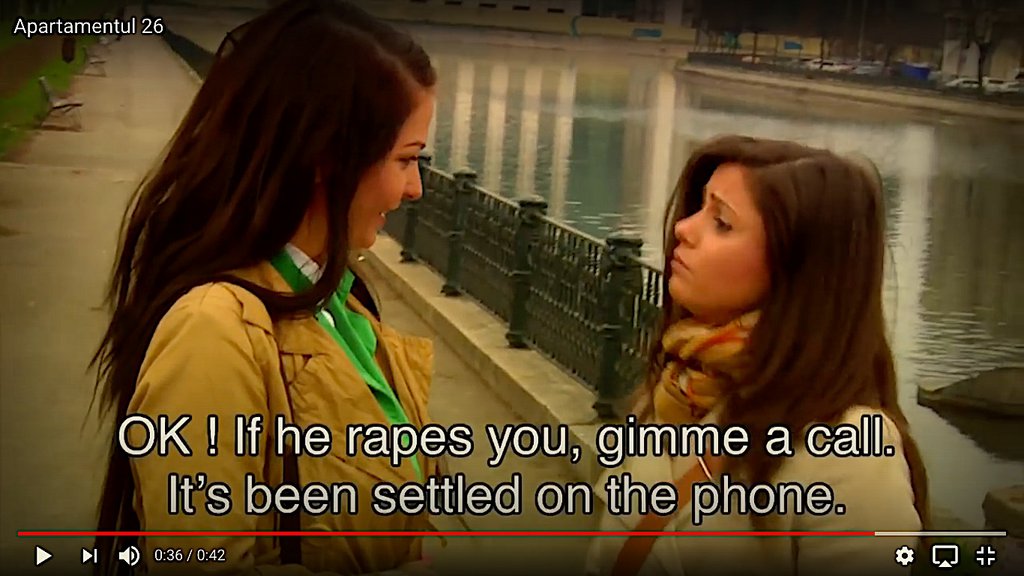
Dialogues and adaptation
Miracle at Tekir Elephant Film, Zurich
LM, fiction, 2015 (completed) Award best picture Swiss, Zurich, 2015:
Ateneu (literary magazine) Prize for Prose, 2015
The Romanian Academy Ion CREANGĂ Prize, 2011
The Romanian Writers' Union Prize for Best Prose/2008
The Prize of the Bucharest Writers’ Association/2007 Convorbiri literare (literary magazine) Prize for Prose, 2006
Nomination for The Book of the Year Award 2008, 2016
Diploma for supporting National Archives (ANR), 2016
The Golden Medal of "Schitul Darvari", for Literary Activity, 2008
Excellence in Teaching - National Award (2000)
"Full of humor in some sequences, in other tragic and ferocious, sometimes fantastic and luminous, like a Chagall painting, which is predominant in this wonderful story Zogru is the figure of the terrible loneliness in which lies the human spirit " (Pedro Gandolfo, El Mercurio, August 19, 2018)
"The Phantom is the narrative catalyst that makes secret forces manifest, especially those of a sexual nature, being also the most visible, single faith, dissolved in the last part of the novel." (Markus Bauer, Neue Zürcher Zeitung )
"In my opinion, the confidence, the artistry of portrayal, the exact and original description of the environment, the quest for a subtle epic crescendo, the illusion of stagnation make Doina Ruști a first class prose writer in current literature." ( Nicolae Breban, when granting the Award of Romanian Academy, 2011)
"Extraordinarias cualidades litterarias." (Antonio J. Hbero, La Opinion, 3 01 2015)
"An ironic and seductive story." (Giuseppe Ortolano - The Friday of the Republic , March 23, 2012, nr 1253)
"Amazing is the fire of a row of stunts of pungent and fulminating expressions that the author devises to describe situations and moods of her protagonist." (Alessandra Iadicicco. La Stampa , no 1815, May 12, 2012)
"Stupefacente è il fuocco di fila di trovate di espressioni pungenti e fulminanti que l'autrice escogita per descrivere situazioni e stati d'animo della sua protagonista." (Alessandra Iadicicco. La Stampa, nr 1815, 12 mai, 2012)
"The talented Romanian writer Doina Rusti, who published Lisoanca, the story of an eleven-year-old who infects an entire village with syphilis and makes victims even among her peers, is making a fool of herself, saving herself as an imaginary creature from another world . The book is also inspired by the great "health" novels, such as The Plague of Camus, where crime takes root more easily in a context of widespread disease. These are certainly the models. " (Gianluca Veneziani, Libero , May 18, 2013)
"Fa il verso ai noir fantastici la brava scrittrice rumena Doina Rusti, che ha dato alle stampe Lisoanca , storia di un’undicenne checontagia con la sua sifilide un intero villaggio, mietendo vittime anchetra le coetanee, salvopoirivelarsi una creatura immaginaria venuta da un altro mondo. Il libro si ispira anche ai grandi romanzi «sanitari», come La peste di Camus, dove il crimine attecchisce più facilmente in un contesto di malattia diffusa. questi sono certamente i modelli." (Gianluca Veneziani, Libero, 18 05, 2013)
"With her shocking book about violence against children, Doina Ruști is making a name for herself with us too. The book gets under your skin and is heavy fare. The sophisticated style contrasts with the brutal plot." (Martina Freier, ekz)
"Even the smallest detail of the novel is veridical" (Magyar Nemzet, December 31, 2015)
"A very admirable story, by the way, very well told. Highly recommended." (Miguel Baquero, The storm in a glass , December 16, 2014)
Mâța Vinerii - a stylistic jubilation, a vital literature, such as Suskind's Perfume to a point, and Evgheni Vodolazkin's Laur, from another point on. (Dan C. Mihăilescu)
The Ghost in the Mill is an imaginative novel, in line with autobiographical fiction, in which magic realism and daily realism intertwine. [...] This mill, which is an axis mundi, the center, the hearth and the obsession of the village, where the character has no clue if he has met the angel or the devil, this mill is the place where a murder occurs, as at the dawn of all worlds: a certain Max, an epileptic, is killed by mistake [...] and everybody is obliged to keep silent, thus becoming accomplices in the murder. We have all been accomplices in what has defined and punished us. This is the parable of communism. A novel with substance, a sinewy prose which, I repeat, equals a part or several parts of Mircea Cărtărescu’s Orbitor”. Dan C. Mihailescu, The man who brings the book, ProTV
"Mit ihrem erschütternden Buch über Gewalt an Kindern macht sie sich auch bei uns einen Namen. Das Buch geht unter die Haut und ist eine schwere Kost. Der anspruchsvolle Stil steht im Gegensatz zu der brutaen Handlung." (Martina Freier, ekz)
"even the smallest detail of the novel is veridical" (Magyar Nemzet, 31 decembrie 2015
"Una historia muy admirable, por cierto, muy bien narrada. Muy recomendable." (Miguel Baquero, La tormenta en un vaso, 16 12. 2014)
For recent media coverage, interviews, and international features, see the News & Press
For critical essays, book reviews, and scholarly studies on her work, visit Critical Reception
Ruști, Doina. Bibliografie critică și studii despre opera Doinei Ruști. www.doinarusti.ro/despre.html#_biblio
, accesat în 2025.
Wikipedia (EN): https://en.wikipedia.org/wiki/Doina_Ru%C8%99ti
Wikipedia (RO): https://ro.wikipedia.org/wiki/Doina_Ru%C8%99ti
VIAF: https://viaf.org/viaf/19221861
ISNI: https://isni.org/isni/0000000109584995
Library of Congress (LCCN): https://id.loc.gov/authorities/names/no00027741
“If you need to clear the air with these gentlemen, better remove yourself from the car!” Julia’s boyfriend, or whatever he was, didn’t seem like much. I had fought more fearsome men in my life.
The love is happiness to be only a rotting cloth in the wound of a stranger.
When I heard him mentioning my mother, whom he had started bespattering in something resembling the English language, calling her “a Norwegian whore”, I opened the door and headbutted him without the slightest hesitation. I yelled at the top of my lungs too, so that bitch, Julia, could hear me loud and clear: “I’m an Irish man, you fucking asshole, I’m from Belfast, we would stick some Semtex up your ass" trailer
If there is no reward, there is no play. People need reward to come into play.
Lizoanca at the age of eleven (Lizoanca la 11 ani)
The Ghost in the Mill (Fantoma din moară)
Zogru
The Phanariot Manuscript (Manuscrisul fanariot)
The Phanariot Manuscript (Manuscrisul fanariot)
The Ghost in the Mill (Fantoma din moară)
The Little Red Man (Omulețul roșu)
The Little Red Man (Omulețul roșu)
Compiled by Pompilia Chifu
A selection of studies, articles, and academic works dedicated to Doina Ruști’s writing, published in journals, collective volumes, and international databases (over 200 critical studies).
See also: Critical Reception
Dan C. Mihăilescu – Woman with a Little Man, in Romanian Literature in the Post-Ceaușescu Era, II. The Present as Dehumanization, Polirom, 2006
Dan C. Mihăilescu – Romanian Literature in the Post-Ceaușescu Era. II. Prose, chapter “Apocalyptic Realism and Derision,” Polirom, 2006
Roberto Merlo, Quaderni di studi.., no. 5, 2010, Edizioni dell’Orso, Turin
Mircea Muthu - cap. The Phanariot Manuscript (Manuscrisul fanariot), în Balcanismul românesc, Școala Ardeleană, 2017, p. 713.
Catrinel Popa - Trecutul ca poveste, Pro Universitaria, 2021.Geo Vasile – The Elixir of Narrative, in The Novel or Life. European Prose Writers, MNLR, 2007
Dumitru Augustin Doman – The Avatars of a Spirit, in The Novel Reader, Ed. Pământul, 2010
Emanuela Ilie – The Fantastic and Alterity, Junimea, 2013
Roberto Merlo – Zogru by Doina Ruști, Between History and Myth, in Quaderni di Studi Italiani e Romeni, 5, 2010, Edizioni dell’Orso, pp. 121–136
George Marcu – Contemporary Female Personalities from Romania, Meronia, 2013
Andrei Simuț – The Post-Communist Romanian Novel…, EMLR, 2015
Roberto Merlo – “Return to Babel,” Neos Edizioni, Turin, 2016
Călin Teutișan – “Levantine Fantastic,” in Encyclopedia of Imaginaries in Romania, ed. Corin Braga, Polirom, 2020
Jeffrey Andrew Weinstock – The Ashgate Encyclopedia of Literary and Cinematic Monsters, Routledge, 2014
Elena Crașovan – The World of the Living Dead…, Dacoromania Litteraria, 2017
Tania Radu – Risky Games, in Literary Fanzines, Humanitas, 2014
Catrinel Popa – The Fantastic Revisited in East-Central European Contemporary Fiction, 2019
Raluca Andreescu, in Studies in Gothic Fiction, Zittaw Press, 2011
Adriana Răducanu – Confessions from the Dead: Reading Ismail Kadare’s Spiritus as a ‘Post-Communist Gothic’ Novel, in Postcolonial Europe? Essays on Post-Communist Literatures and Cultures, eds. Dobrota Pucherova and Robert Gafrik, Brill, 2015
Alina Bako – Images of Alterity in Contemporary Women’s Prose, Speculum, 2017
Dana Bădulescu, Maria-Sabina Draga Alexandru and Florina Năstase (eds.) – Women’s Imaginary Cooking and Appetites Across Cultures: Studies in Literature, Cambridge Scholars Publishing, 2025
Pompilia Chifu – Doina Ruști, a Character in Her Own Book, Casa Cărții de Știință, 2025 (monographic study)
Christene d’Anca – Mediating a Loss of History…, Journal of European Studies, 2018
Dana Sala – Alessandro Baricco’s Seta and Doina Ruști’s Manuscrisul fanariot, 2015
Alina Puskás-Bajkó – Maiorca or on the gipsy magic realism…, Journal of Romanian Literary Studies, 2021
Florina Cotoară – Zogru – the Initiating Journey, JRLS, 2017
Dumitru-Mircea Buda – Homeric or about the magical powers of storytelling, Acta Marisiensis, 2019 Integral
Cristina Balinte – The memory crisis…, Philology & Cultural Studies, 2017
Ilona Bădescu – Comparative structures referring to the human body in Doina Ruști’s Manuscrisul fanariot, Analele Universității din Craiova, Lingvistică, no. 1–2, 2022, pp. 237–253. CEEOL
Inga Duță – Expressive oppositions in Ciudățenii amoroase…, 2024
Simona Antofi – Gastronomy and literature in Doina Ruști’s novel Mâța Vinerii, Analele Universității Ștefan cel Mare, Suceava
Alina Bako – Contemporary Romanian Historical Fiction…, 2025
Valeska Bopp-Filimonov – Saddening Encounters. Children and Animals in Romanian Fiction and Beyond, Studia Universitatis Babeș-Bolyai, 67/2022
Raluca Andreescu – A Pilgrim Through Mortal Blood: A Post-Communist Rewriting of the Western Vampire, ResearchGate, 2011
***Doina Rusti. *Lumi, istorii, combinații simbolice *, volum omagial de studii, coord. Emanuela Ilie, Vasiliana, 2022
Adrian Jicu – “The Phanariot Manuscript – a fabulous novel”, Ateneu, no. 10, October 2015
Valeria Manta Taicuțu – “The Phanariot Manuscript”, Cafeneaua literară, December 2015
Călina Bora – “The Phanariot Manuscript”, Steaua, no. 7–8, 2015
Magdalena Popa Buluc – “The Phanariot Manuscript”, Cotidianul, April 7, 2015
Tudorel Urian – “The Mysteries and Charm of Bucharest (The Phanariot Manuscript)”, Viața Românească, no. 11, November 2015, p. 8
Ioan Groșan – “A revelation-novel”, Observator cultural, no. 792, October 2, 2015
Mihaela Grădinaru – “Prisoners inside the manuscript”, Cronica veche, no. 10, October 2015
Dan Cristea – “A poematic version of the historical novel”, Luceafărul de dimineață, no. 7, July 2015, p. 4
Mariana Criș – “The Phanariot Manuscript”, Cultura, no. 525, July 18, 2015
Stelian Țurlea – “Simplicity opens the path to grandeur: Doina Ruști’s The Phanariot Manuscript”, Ziarul financiar, May 21, 2015
Adrian G. Romilă – “Phanariot décor”, Convorbiri literare, May 2015
Lucian Alecsa – “The Phanariot Manuscript”, Hyperion, no. 4–5–6, 2015
Cristian Teodorescu – “The Phanariot Manuscript”, Cațavencii, April 16, 2015
Alina Purcaru – “Idylls from Phanariot Bucharest”, Observator cultural, no. 770, May 1, 2015
Gabriela Gheorghișor – “The magic of storytelling”, Ramuri, no. 4, 2015
Luminița Corneanu – “Love in Phanariot Bucharest”, România literară, April 3, 2015
Emanuela Ilie – “The Phanariot Manuscript”, Convorbiri literare, March 2016
Mircea Muthu – “The Phanariot Manuscript. Word, style”, Apostrof, no. 4 (311), April 2016 (link in list)
Gabriel Enache – “The Phanariot Manuscript”, Cultura de sâmbătă, March 3, 2016
Dana Sala – “Alessandro Baricco’s Seta (Silk) and Doina Ruști’s* Manuscrisul fanariot* (The Phanariot Manuscript)**”, in Weaving a Narrative from Metamorphoses, 2015, ALLRO, vol. 22, article code 487-121
Alina Puskás-Bajkó – “Maiorca or on the gipsy magic realism of seduction in Doina Ruști’s Manuscrisul fanariot**”, Journal of Romanian Literary Studies, no. 6/2021, p. 546
Ilona Bădescu – “Comparative structures referring to the human body in Doina Ruști’s Manuscrisul fanariot**”, Analele Universității din Craiova, Lingvistică, no. 1–2, 2022, pp. 237–253 (CEEOL)
Claudia Nițu – The struggle for identity and freedom in Manuscrisul fanariot, Elefantul de bibliotecă
Bianca Burța Cernat – “Fiction and magic in Phanariot Bucharest”, Observator cultural, no. 863, 2017
Gabriela Gheorghișor – “Phanariot Bucharest from enchanted coral”, Ramuri, no. 4, 2015 (link in list)
Alina Bako – “Contemporary Romanian Historical Fiction as a Mediating Transistor of the ‘Zemiperiphery’ (The Phanariot Manuscript)”, Studia Universitatis, Philologia, 2025, vol. 70
Inga Druță – “Expressive oppositions in ‘Ciudățenii amoroase din Bucureștiul fanariot’”, in Limbă, Literatură, Folclor (article; IDS/IBN link in list)
Inga Duță – “Expressive oppositions in Ciudățenii amoroase…**”, Cercetări lingvistice, 1, 04.2024 (Institute of Philology “B.P.-Hasdeu” of MSU). https://ibn.idsi.md/ro/vizualizare_articol/207030
Christene d’Anca – “Mediating a loss of history in Doina Rusti’s The Ghost in the Mill**”, Journal of European Studies, vol. 48, 3–4 (2018), pp. 265–277; first published Oct 22, 2018
Andrei Simuț – “Fictionalizing panoramas of the communist past: Un singur cer deasupra lor, Fantoma din moară, Pupa russa”, in The Post-Communist Romanian Novel…, EMLR, 2015
Doris Mironescu – “Fantoma din moară”, Suplimentul de cultură, May 9–15, 2009, p. 10
Constantin Dram – “The novel’s multiple memory”, Convorbiri literare, no. 10, October 2008
Mihaela Ursa – “History at MAX”, Apostrof, no. 11, 2008
Adrian Neculau – “The mill, the ghosts, the fear”, Ziarul de Iași, April 27, 2009
Adriana Bittel – “Doina Ruști: Fantoma din moară**”, Formula AS, no. 854, 21.02.2009
Radu Nedelcuț – “Look back in anger”, Noua literatură, April 2009
Silviu Gongonea – “Fantoma din moară”, Mozaicul, no. 7/2009
Ovidiu Șimonca – “Without pathos…”, Observator cultural, no. 465, 2009
Dan Cristea – “In seeking the origins”, Luceafărul, no. 1, 2009
Mihai Iovănel – “Travelling circular”, Cultura, no. 4, 29.01.2009
Bianca Burța Cernat – “Rehabilitating the realist illusion”, Observator cultural, no. 459, 29.01.2009
Șerban Axinte – “Memory and suspense”, Observator cultural, no. 459, 29.01.2009
Paul Cernat – “Romanian communism in the mill of magical realism”, Revista 22, “Bucharest Cultural”, no. 2, December 2008
Adriana Stan – “Fantoma din moară”, Cultura, 29.01.2009
Lucian Alexa – “Fantoma din moară”, Evenimentul zilei, September 26, 2009
Constantin Dram – “Reality in struggle with fiction”, Convorbiri literare, April 2008
Horia Gârbea – “Editorial event: Fantoma din moară**”, Săptămâna financiară, 03.10.2008; and Luceafărul, no. 32/2008
Markus Bauer – “International aktuelle themen… [Fantoma din moară]”, Neue Zürcher Zeitung, 04.01.2018
Elena Crașovan – “The World of The Living Dead…”, Dacoromania Litteraria, IV/2017, pp. 93–109
(entries translated in the same manner; titles kept in original where appropriate, publication data preserved)
(entries translated in the same manner)
More: here
(entries translated in the same manner)
Eugen Cadaru – The Metaphysics of the Oneiric Phenomenon, La Punkt
Ioana Cistelecan – The Centipede Book, Familia, Feb 22, 2021
Petrișor Militaru – “Doina Ruști’s Paturi oculte. Insertions of Surreality**”, Mozaicul, no. 11–12/2021
Serenela Ghițeanu – The Cosmic Rustle of Carob Leaves, Revista 22, December 8, 2020
More: here
(entries translated in the same manner)
More: here
(entries translated in the same manner)
(entries translated in the same manner)
(entries translated in the same manner)
(entries translated in the same manner; outlet names preserved; dates kept as in list)
More: here
(entries translated in the same manner)
(entries translated in the same manner)
(entries translated in the same manner)
(entries translated in the same manner)
See also: CRITICAL RECEPTION of the novels signed by Doina Ruști
2.1. Novels
Platanos, Youngart, 2025
Sălbatica, Booklet, 2025
Ferenike, Humanitas, 2025
Zavaidoc în anul iubirii, Bookzone, 2024
Paturi oculte/Occult Beds, Litera, BPC, 2020
Homeric, Polirom, Fiction Ltd, 2019
Logodnica, Polirom, Fiction Ltd, 2017
Mâța Vinerii/The Book of Perilous Dishes, Polirom, Fiction Ltd, 2017, Top 10+, 2018
Manuscrisul fanariot/The Phanariot Manuscript, Polirom, Fiction Ltd, Top 10+, 2016, 2017
Mămica la două albăstrele, Polirom, 2013
Patru bărbați plus Aurelius /Four Men plus Aurelius, Polirom, 2011
Cămașa în carouri și alte 10 întâmplări din București /The Plaid Shirt (epic puzzle), Polirom, 2010, Litera, 2023
Lizoanca la 11 ani (novel), Ed. Trei, 2009; Polirom, 2017; Litera 2022
Fantoma din moară/The Ghost in the Mill, Polirom, Ego. Proză, Litera: 2008; 2017, 2024
Zogru (novel), Polirom, Iași, 2006; 2013
Omulețul roșu/The Little Red Man, Ed. Vremea, Bucharest, 2004; 2012
2.2. Short fiction
2.2.1. Volumes
Depravatul din Gorgani, Litera, 2023
Ciudățenii amoroase din Bucureștiul Fanariot/The Curious Loves of Phanariot Bucharest, Litera, 2022
2.2.2. Periodicals, anthologies, textbooks
The Blue Forest, textbook, 7th grade, Geanina Oprea
Cocrișel, in When the Future Was Small (ed. Florentina Sâmihăian), foreword by Liviu Papadima, illustrations by Oana Ispir & Dan Ungureanu; ART, Arthur, 2021
Herr, in Thirteen, Litera, BPC, 2021
Platanos, textbook for 8th grade, ART Publishing House, 2020
The Secret, “Echinox Anthology”, no. 1, 2018
Kant and Max, in the anthology “PEN95 Romania”, 2017
The Treacherous Shadow of a Love, Apostrof magazine, no. 8, 2016
European Union, in the volume How We Love, Vellant Publishing House, 2016
The Lost Militiaman, in the volume Writers at the Police, Polirom, 2016
Cream Truffles, România literară, no. 31, 2015
The Mangy Forest, Ramuri, no. 2, 2014
35 Minutes After, România literară, 2014
The Visit, România literară, no. 8, 2013
The Black Fiat, Viața românească, no. 9–10, 2013
Prince Avolo, in Who’s Afraid of Computers? (eds. Tina Sâmihăian, Liviu Papadima), Arthur Publishing House, 2013
Trattoria Amore, Catchy, April 30, 2012
The Mall Cinema, România literară, no. 7, 2012
The DNA Crypts, Ziarul financiar, June 15, 2012
The Lover, România literară, no. 29, 2011
How Cici Bezergheanu’s Disenchantment Began, Bucharest Cultural, no. 107, July 19, 2011
Provincial Magazine, Obiectiv Cultural, May 2, 2011
The Red Whistle, Timpul magazine, March 2011
Apartment 26, Timpul, March 2011
Lost Details, in “Contemporary Romanian Literature”, Echinox anthology, 2011
Topaz Earrings, “Old and New Bucharest”, Editura Subiectiv, 2011 (ed. Andrei Slăvuțeanu)
Năltărogul, “Old and New Bucharest”, Editura Subiectiv, 2011 (ed. Andrei Slăvuțeanu)
Mrs. Glodeanu’s Long-Awaited Hour — Revista 22, “Bucharest Cultural”, no. 103, 2010
The Devil in Love, Revista la plic, no. 4, 2010, Chișinău
Bill Clinton’s Hand, Revista 22, “Bucharest Cultural”, no. 95, 2010
The Message in the Bottle, “Mnemosyning”, “Triade”, 2010
My Gynecologists, in the volume “Travel Companions” (eds. Dan Lungu, Radu Pavel Gheo), Polirom, 2010
A Murderous Lout’s Noon, România literară, no. 25, 2010
The Imp from Batiște Street, Luceafărul de dimineață, no. 1–2, 2010
Beyond the Purple Gate, in What’s the Deal with Reading, Art Publishing House, 2010 (eds. Liviu Papadima, Tina Sâmihăian)
The Victor, Convorbiri literare, March 2009
Marțisara’s Gift, in Bookătăria de texte (“The Text Kitchen”), “The Illustrators’ Club” (ed. Florin Bican), 2009 (collective volume)
The Wig Shop, România literară, no. 52, 2009
An Easter Story, România literară, no. 15, 2009
The MP Collapses, “Nine Unpublished Political Novellas”, Tritonic Publishing House, 2009 (editor/coordinator: Horia Gârbea)
Horia Gârbea (collective volume)
A Crime and Four People Who Chatter On, Hyperion magazine, 1–3, 2009 (story written in 1990)
The Padlock and the Key, România literară, no. 45, 2008
SIGCHLD, fork() and sleep(), under the title The History Lesson, România literară, no. 29, July 25, 2008
Cherries in Asphalt, in “Pranks, Tears, and a Bucket of Blood”, Limes Publishing House, 2008 (ed. Mircea Petean) — Writers’ Union anthology
My Uncle, the Postman, Mozaicul, no. 4, 2008
European Union, România literară, no. 48, 2007
Cristian, România literară, no. 17/2007
Tits, in “Romanian Erotic Stories”, Editura Trei, 2007
Near St. Silvestru Church, Convorbiri literare, November 2006
Lulu, Vatra, no. 11–12, 2005
The Message, Viața Românească, no. 8–9, 2004
F A I R Y T A L E S
The Beauty from Milk, The Red Man, etc., in Romanian Mystical Fairy Tales and Stories, Retold (in collaboration with Horia Gârbea and Liviu Ioan Stoiciu), Paralela 45 Publishing House, 2007
The Imp’s Dream, in the volume More and More, Art Publishing House, 2017, etc.
3. Editions, texts published in other languages (selective)
3.1 Novels – in translation
A malom kísértete, Orpheusz Kiadó, Budapest, 2024. Trans. Enikő Szenkovics
Zogru, Les Editions du Typhon; Marseille, 2022. Trans. Florica Courriol
Doreshrimi fanariot, Dukagjini Publishing House, trans. Maniela Sota, Prishtina, Republic of Kosovo, 2024
Das Phantom in der Mühle, Verlag Klak, Berlin, 2018, trans Eva Wemme; [Leipzig]
Freitagskatze, Verlag Klak, Berlin, 2018, trans. Roland Erb
La gata del viernes, Esdrújula Ediciones, Granada, 2019, trans. Enrique Nogueras
The Book of Perilous Dishes, Neem Tree Press, London, 2022, trans. James Ch. Brown
Arto receptek konyve, Orpheusz Kiadó, Budapest, 2018. Trans. Enikő Szenkovics
Lisoanca, Horlemann Verlag, Berlin, 2013, trans. Jan Cornelius
Lisoanca, Rediviva Edizioni, Milan, 2013, trans. Beatrice Coman
Eliza a los once años, Ediciones Traspiés, Granada, 2014
Lizoanca tizenegy évesen, Orpheusz, Budapest, 2015, trans. Enikő Szenkovics
Eliza, Antolog, Skopje, 2015, trans. Alexandra Kaitozis
Lizoanca, 11 godina, ŠTRIK Publishing House, Belgrade, 2021, trans. Daniela Popov
Zogru, Les Editions du Typhon, Marseille, 2022, trans. Florica Courriol
Zogru, Descontextos, Santiago de Chile, 2018, trans. Sebastian Teillier
Zogru, Balkani Publisher, Sofia, 2008, trans. Vasilka Alexova
Zogru, Bonanno Editore, Rome, 2010, trans. Roberto Merlo
Zogru, Sétatér Kulturális Egyesület, 2014, trans. Enikő Szenkovics
L’omino rosso, Nikita Editore, Florence, 2012, trans. Roberto Merlo
L’omino rosso, Sandro Teti Editore, Rome, 2021, trans. Roberto Merlo
3.2. Chapters, stories in translation
The Ghost in the Mill (Fantoma din moară) (excerpt), in Your Impossible Voice, 2021, trans. Ileana Marin
Cong Quan Shan Dao Ping Yuan De Li Zan, Si Chuan Min Zu Chu Ban She, Sichuan, 2019
The Truancy, The Stockholm Review of Literature
The Phanariot Manuscript (trans. Liana Grama), Trafika Europe, Penn State University Libraries, no. 8, 2016
The Lover (trans. Andrew Davidson), Trafika Europe, Penn State University Libraries, no. 8, 2016
Eliza (Lizoanca), trans. Alexandra Kaitozis, Antolog, Skopje, 2015
Eliza a los once años, Ediciones Traspiés, Granada, 2014 (trans. Enrique Nogueras)
Lizoanca tizenegy évesen, trans. Enikő Szenkovics, Orpheusz Kiadó, Budapest, 2015
Fenerlilere ait elyasmasi eser (Manuscrisul fanariot), excerpt, trans. Leila Unal, Sözcükler, 58, April 2015, Istanbul
Zogru, Sétatér Kulturális Egyesület, 2014, via the “Franyó Zoltán” scholarship granted by the Hungarian government (trans. Enikő Szenkovics)
Lizoanca, Horlemann Verlag, Berlin, 2013 (trans. Jan Cornelius)
Lisoanca, Rediviva Edizioni, Milan, 2013 (trans. Ingrid Beatrice Coman)
Apartment 26, trans. Oana Ursulesku, Koračić, Belgrade, 2013
L’omino rosso, Nikita Editore, Florence, 2012 (trans. Roberto Merlo)
Bill Clinton’s Hand, Bucharest Tales, New Europe Writers, 2011 (eds. A. Fincham, J. G. Coon, John a’Beckett)
Kareli gomlek ve Bukreș'teki Bașka On Hadise (Cămașa în carouri și alte 10 întâmplări din București), trans. Cristina Dincer, Kalem Kültür Yayınları, Istanbul, 2011
I miei ginecologi, in Compagne di viaggio, Sandro Teti Editore, 2011 (trans. Anita Bernacchia) (eds. Radu Pavel Gheo, Dan Lungu)
Ura pri univerzi, Zgodbe iz Romunije, Sodobnost International, Ljubljana, 2011
Zogru (trans. Roberto Merlo), Ed. Bonanno, 2010, Rome; Catania
L’omino rosso (trans. Roberto Merlo), in Il romanzo romeno contemporaneo, Ed. Bagatto Libri, 2010, Rome
Zogru (excerpt) and biobibliographical presentation, in 11 books contemporary Romanian prose, Polirom, 2006, trans. Alistair Ian Blyth
Zogru (novel), Balkani Publishing House, Sofia, trans. Vasilka Alexova
Învingătorul (The Victor) — anthology of the magazine Nagyvilag (trans. Noémi László), Budapest, Sept. 2010
Cristian (French trans. Linda Maria Baros), Paris, Le Bateau Fantôme, no. 8, 2009, ed. Mathieu Hilfiger
Cristián (trans. Sebastián Teillier), Madrid, El fantasma de la glorieta, no. 16/2008
Cristian (trans. Alistair Ian Blyth), ICR anthology, 2011
The Beginning (poem), in Under a Quicksilver Moon, 2002, USA, Library of Congress
Dictionary of Symbols in Mircea Eliade’s Work (excerpt), in La Jornada Semanal, nos. 455–456, 2003 (trans. José Antonio Hernández García)
After the monograph Doina Ruști as a Character in Her Own Book by Pompilia Chifu (doctoral dissertation).
Doina Ruști. Critical Bibliography and Studies on the Work of Doina Ruști. www.doinarusti.ro/despre.html#_biblio, accessed in 2025.